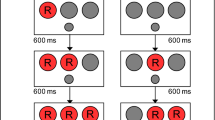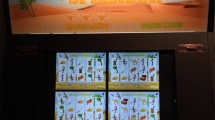Abstract
Near misses are a special kind of reinforcement which increases one’s desire to play. The aim of this paper is to examine the perception of near misses in normal population. We used a slot machine simulation running on a PC, where participants had to play four rounds with different near miss ratios (0, 15, 30 and 45%). Our sample consisted of 159 individuals with mean age of 22.8 and with no or little gambling experience. For data analysis we used chi-squared goodness-of-fit test and exact binomial test. Despite the fact, that there was a notable effect of near misses results showed that the subjects could not perceive trials of them.


Similar content being viewed by others
References
Chantal, Y., Vallerand, R. J., Ladouceur, R., & Ferland, F. (1995). How close is close enough? Near-miss perceptions and gambling. Paper presented at the American Psychological Association Annual Convention. Toronto, Canada.
Chase, H. W., & Clark, L. (2010). Gambling severity predicts midbrain response to near-miss outcomes. The Journal of Neuroscience, 30(18), 6180–6187.
Clark, L., Lawrence, A. J., Astley-Jones, F., & Gray, N. (2009). Gambling near-misses enhance motivation to gamble and recruit win-related brain circuitry. Neuron, 61, 481–490.
Cote, D., Caron, A., Aubert, J., Desrochers, V., & Ladouceur, R. (2003). Near miss prolong gambling on a video lottery terminal. Journal of Gambling Studies, 19(4), 433–438.
Dixon, M. R., & Schreiber, J. E. (2004). Near-miss effects on response latencies and win estimations of slot machine play. Psychological Record, 54, 335–348.
Griffiths, M. D. (1990). The acquisition, development and maintenance of fruit machine gambling in adolescence. Journal of Gambling Studies, 6, 193–204.
Griffiths, M. D. (1991). The psychobiology of the near miss in fruit machine gambling. Journal of Psychology, 125, 347–357.
Griffiths, M. D. (1993). Fruit machine gambling: The importance of structural characteristics. Journal of Gambling Studies, 9(2), 101–120.
Griffiths, M. D. (1999). The psychology of the near-miss (revisited): A comment on Delfabbro & Winefeld (1999). British Journal of Psychology, 90, 441–445.
Kassinove, J. I., & Schare, M. L. (2001). Effects of “near miss” and “big win” on persistence at slot machine gambling. Psychology of Addictive Behaviors, 15(2), 155–158.
Körmendi, A., & Kurucz, G. (2010). A “majdnem nyertem” jelenség vizsgálata nem szerencsejátékos mintán. Pszichológia, 30(4), 335–348.
Maclin, O. H., & Dixon, M. R. (2006). Using a computer simulation of three slot machines to investigate a gambler’s pereference among varying densities of near-miss alternatives. Behavior Research Methods, 39(2), 237–241.
Reid, R. L. (1986). The psychology of the near miss. Journal of Gambling Behavior, 2(1), 32–39.
Sharpe, L., Blazczynski, A., & Walker, M. (2004). The identification of near misses in electronic gaming machines and its effect on gambling behaviour. (Unpublished research paper at OLGR).
Turner, N., & Horbay, R. (2004). How the slot machines and other electronic gambling machines actually work? Journal of Gambling Issues, 11, 1–41.
Wohl, M. J. A., & Enzle, M. E. (2003). The effect of near wins and near losses on self-perceived personal luck and subsequent gambling behavior. Journal of Experimental Social Psychology, 39, 184–191.
Author information
Authors and Affiliations
Corresponding author
Rights and permissions
About this article
Cite this article
Kurucz, G., Körmendi, A. Can We Perceive Near Miss? An Empirical Study. J Gambl Stud 28, 105–111 (2012). https://doi.org/10.1007/s10899-011-9240-6
Received:
Accepted:
Published:
Issue Date:
DOI: https://doi.org/10.1007/s10899-011-9240-6




